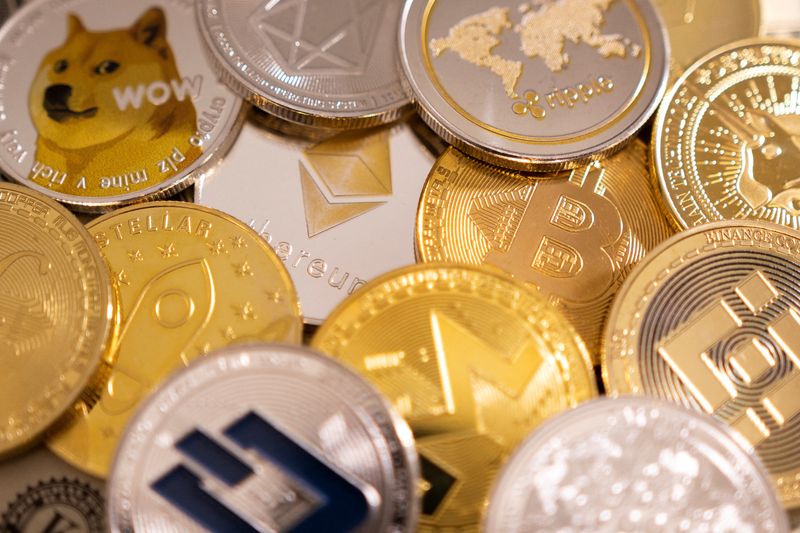EU lawmakers set to tighten up on crypto transfers By Reuters
[ad_1]
 © Reuters. FILE PHOTO: A representations of cryptocurrencies in this illustration taken, January 24, 2022. REUTERS/Dado Ruvic/Illustration
© Reuters. FILE PHOTO: A representations of cryptocurrencies in this illustration taken, January 24, 2022. REUTERS/Dado Ruvic/Illustration2/2
By Huw Jones and Tom Wilson
LONDON (Reuters) – European Union lawmakers were set on Thursday to back tougher safeguards for transfers of bitcoin and other cryptocurrencies, in the latest sign that regulators are tightening up on the freewheeling sector.
Two committees in the European Parliament have thrashed out cross-party compromises to be voted on. Crypto exchange Coinbase (NASDAQ:) Global Inc has warned the rules would usher in a surveillance regime that stifles innovation.
The $2.1 trillion crypto sector is still subject to patchy regulation across the world. Concerns that bitcoin and its peers could upset financial stability and be used for crime have accelerated work by policymakers to bring the sector to heel.
Under the proposal first put forward last year by the EU’s executive European Commission, crypto firms such as exchanges would have to obtain, hold, and submit information on those involved in transfers.
That would make is easier to identify and report suspicious transactions, freeze digital assets, and discourage high-risk transactions, said Ernest Urtasun, a Spanish Green Party lawmaker helping to steer the measure through the parliament.
The Commission had proposed applying the rule to transfers worth 1,000 euros ($1,116) or more, but under the cross-party agreement this ‘de minimis’ rule has been scrapped – meaning all transfers would be in scope.
Urtasun said removing the threshold brings the draft law into line with rules from the global Financial Action Task Force that sets standards for combating money laundering. Those rules mean crypto firms must collect and share data on transactions.
An exemption for low value transfers is not appropriate, as crypto users could dodge the rules by creating an almost unlimited number of transfers, Urtasun said, also citing the small amounts involved in transfers linked to some crime.
The lawmakers’ committees have also agreed on new provisions on crypto wallets held by individuals, not exchanges, and on the creation of an EU list of high-risk or non-compliant cryptoasset service providers.
Coinbase Chief Legal Officer Paul Grewal said in a blog on Monday that traditional cash, not crypto, was by far the most popular way to hide financial crime.
EU states have joint say with parliament on the final version of the law and countries have already agreed among themselves there should be no de minimis.
($1 = 0.8961 euros)
Fusion Media or anyone involved with Fusion Media will not accept any liability for loss or damage as a result of reliance on the information including data, quotes, charts and buy/sell signals contained within this website. Please be fully informed regarding the risks and costs associated with trading the financial markets, it is one of the riskiest investment forms possible.
[ad_2]
Source link
 © Reuters. FILE PHOTO: A representations of cryptocurrencies in this illustration taken, January 24, 2022. REUTERS/Dado Ruvic/Illustration
© Reuters. FILE PHOTO: A representations of cryptocurrencies in this illustration taken, January 24, 2022. REUTERS/Dado Ruvic/Illustration2/2
By Huw Jones and Tom Wilson
LONDON (Reuters) – European Union lawmakers were set on Thursday to back tougher safeguards for transfers of bitcoin and other cryptocurrencies, in the latest sign that regulators are tightening up on the freewheeling sector.
Two committees in the European Parliament have thrashed out cross-party compromises to be voted on. Crypto exchange Coinbase (NASDAQ:) Global Inc has warned the rules would usher in a surveillance regime that stifles innovation.
The $2.1 trillion crypto sector is still subject to patchy regulation across the world. Concerns that bitcoin and its peers could upset financial stability and be used for crime have accelerated work by policymakers to bring the sector to heel.
Under the proposal first put forward last year by the EU’s executive European Commission, crypto firms such as exchanges would have to obtain, hold, and submit information on those involved in transfers.
That would make is easier to identify and report suspicious transactions, freeze digital assets, and discourage high-risk transactions, said Ernest Urtasun, a Spanish Green Party lawmaker helping to steer the measure through the parliament.
The Commission had proposed applying the rule to transfers worth 1,000 euros ($1,116) or more, but under the cross-party agreement this ‘de minimis’ rule has been scrapped – meaning all transfers would be in scope.
Urtasun said removing the threshold brings the draft law into line with rules from the global Financial Action Task Force that sets standards for combating money laundering. Those rules mean crypto firms must collect and share data on transactions.
An exemption for low value transfers is not appropriate, as crypto users could dodge the rules by creating an almost unlimited number of transfers, Urtasun said, also citing the small amounts involved in transfers linked to some crime.
The lawmakers’ committees have also agreed on new provisions on crypto wallets held by individuals, not exchanges, and on the creation of an EU list of high-risk or non-compliant cryptoasset service providers.
Coinbase Chief Legal Officer Paul Grewal said in a blog on Monday that traditional cash, not crypto, was by far the most popular way to hide financial crime.
EU states have joint say with parliament on the final version of the law and countries have already agreed among themselves there should be no de minimis.
($1 = 0.8961 euros)
Fusion Media or anyone involved with Fusion Media will not accept any liability for loss or damage as a result of reliance on the information including data, quotes, charts and buy/sell signals contained within this website. Please be fully informed regarding the risks and costs associated with trading the financial markets, it is one of the riskiest investment forms possible.